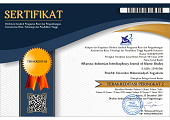Muhammadiyah dan Spirit Islam Berkemajuan dalam Sinaran Etos Alqur’an
Abstract
Muhammadiyah, one of the largest Islamic movement, has gone beyond a century, and it remains continuously in upholding the ideals of establishing “the truly Islamic society”. What is the Muhammadiyah spirit of sustainability in ad- dressing the challenges of the times? Through library approach, this study finds that the Muhammadiyah movement always loyal to and take inspiration from the three ethos of the Quran in achieving the goal of building a truly Islamic society, those are the ethos of rahmah (compassion), al-Ma’un and al-`Ashr. That ethos has been always established on integrative-interconnective approach between the in- terpretation of the Quran, the sacred heart-mind and the findings of science and technology, and the universal experience of humanity. Rationality is a key of developing the sacred heart-mind capabilities, in addition to experiencing of many nationalities and faiths. From here we know about how to save the lives of people in the world based on the ethos of rahmah. Human happiness is consisting of sincerity, remembering to death, and put science as the key to progress together. Muhammadiyah is also identical with the ethos of al-Ma`un, the religious worth of social praxis. Religiosity tends to reject the formalities of religion for it has been included in the social alignments to advocate the weaks. Al-`Ashr ethos means that religion (iman) and civilization (`amal shalih) are placed as two sepa- rate entities and should be achieved separately. Religion as symbolic formalities is to be important here. Civilization is built through a process of “learning and experiment” and persistency to defeat yourself. Last but not least, Muhammadiyah is no longer overly concerned with the poverty issue, but also regarded to the effective systems and institutions under the effective leadership in building al- hadarah al-fadhilah.
Keywords
Full Text:
PDFDOI: https://doi.org/10.18196/afkaruna.v13i1.4202
Refbacks
- There are currently no refbacks.
Copyright (c) 2017 Afkaruna: Indonesian Interdisciplinary Journal of Islamic Studies

This work is licensed under a Creative Commons Attribution-ShareAlike 4.0 International License.
Afkaruna: Indonesian Interdiciplinary Journal of Islamic Studies indexed by:












1.png)


